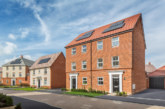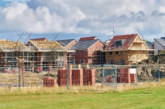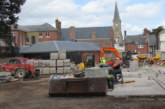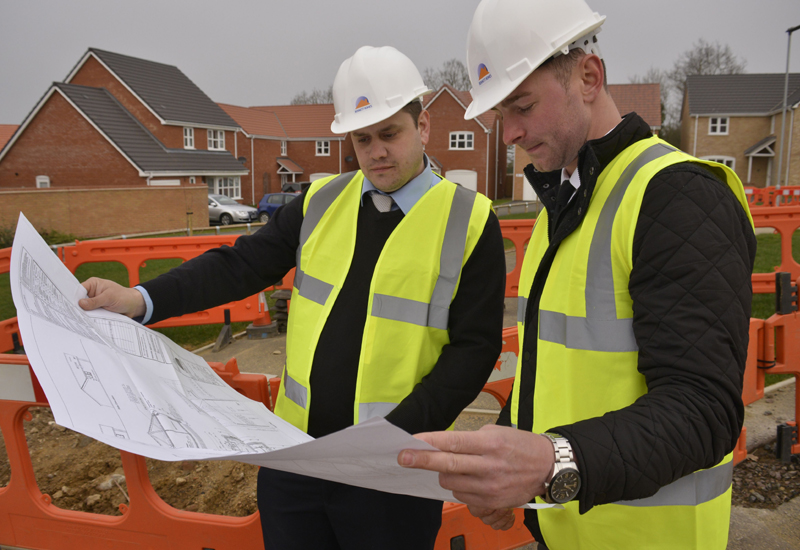
East Anglian housebuilder Bennett Homes is celebrating its 70th anniversary in 2017. PHPD recently visited this regional builder to discover how it has fared through the years and why the business remains a committed SME housebuilder.
Once well known in East Anglia as a builder of bungalows, Bennett Homes has evolved through the years to become a builder of new homes for all areas of the market: first-time buyers, family homes, executive houses and the retirement sector.
The beginning of its journey can be charted to the years following the end of the Second World War. In 1947 RAF pilot Josh Bennett took his demob money and used it to help set up a housebuilding firm – no doubt seeing an opportunity to help replace the thousands of homes destroyed during the war and seeking to provide good quality homes for all.
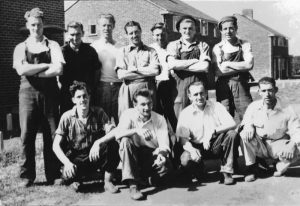
The firm began life in Lakenheath, Suffolk operating out of a bungalow – which was extended a number of times to accommodate the growth of the business. Josh Bennett continued to run the house building business, providing homes for thousands of people across Suffolk and Norfolk, until 1972 when he sold it to Nigel Parker, a Civil Engineer from Tottenham in search of a construction business in East Anglia. Nigel had been evacuated during the war to East Anglia and had always wanted to return to live and work in the region.
Remaining Chairman of the business until 2006, Nigel helped develop Bennett Homes and it was during this period that the company grew to largest point, building around 250 homes in one year of the mid-1980s.
Current Managing Director Edward Parker – Nigel’s son – started with the firm in 1998 following a Degree in Construction from Sheffield Hallam University and experience in the contracting market. After working as Operations Director at Bennett Homes for almost ten years Edward became MD a little over a decade ago. Today the firm is based on the outskirts of Bury-St-Edmunds in a converted barn.
Impact of the recession
As we all know the most recent recession hit the whole industry hard and Bennett Homes was no exception. The company was forced to reduce its annual build rate and by 2009 it was building around 50 homes a year. Edward explained: “It did have an impact on us and like many in the industry we lost staff. We had learnt from previous recessions to retain good quality staff where we could. We had a good land bank, so we slowed down land buying. We are an SME and availability of funding is a pretty difficult area. So we got ourselves to, and maintained, a position where we were self-funding throughout that recession which gave us a layer of insulation.”

The company also learnt a lot during the period, on how to benefit from efficiencies and diversify its portfolio to manage risk more effectively. Coming out of the recession it reviewed and updated its standard house types. It also looked to expand geographically, into North Essex, and broadened its offering with executive homes, homes for growing families and options for first-time buyers.
Recalling the period Edward reflected on the impact of the recession on the housebuilding sector: “Very sadly for the industry as a whole, a lot of SMEs didn’t survive it. The loss of the SMEs from the industry is a great loss to the country as I think it results in less diversification of product and also SMEs tend to get onto sites quicker and build out faster. The lack of SMEs is having a brake on the rate at which we build new homes in this country. That is the great loss of the recession. Lots of SMEs have gone.”

Quality issues
In 2016 the firm built 75 new homes – and it plans to build around 100 in 2017 – and it uses the fact that it has chosen to remain an SME to inform its approach to the market. This very conscious choice allows it to focus on three areas where Bennett Homes believes it can find a benefit over larger builders: a commitment to customer service, a high level of build quality and a comprehensive standard specification.
Commenting on build quality, Edward believes that standards today are more demanding than ever before: “Build quality is better today than it has been over the decades, “ he noted, “standards have continually improved, and that is why a new home is such a good prospect for buyers.”
Its commitment to quality has been reflected in its current standing as the National Federation of Builders (NFB) Housebuilder of the Year in 2016, the fourth time the company has held the accolade.
Customer service
The company has also won a string of regional awards for its customer service. Edward explained that the Customer Care team spends time getting to know buyers and clients will have the same Home Advisor as their point of contact throughout the process.

The process includes two initiatives which Bennett Homes feels help to underline its approach to customer care. ‘Lend-a-home’ is a scheme that offers new buyers a house they can move into for a short period (rent free) within 20-30 miles of their new home. “Should the buyer be in a chain,“ noted Edward, “this helps break the time-periods involved.” Bennett Homes will then also cover the cost of the second move, into the buyer’s new home.
There is also an offer of ‘handy-man’ help when moving in. For half a day Bennett Homes will provide a couple of its staff to help with some of the DIY tasks associated with moving into a new home – putting up mirrors, curtain polls etc…
The company also offers a three-month ‘homecheck’ service to look round the home, fill any cracks or re-touch paint if it was damages during the move.
Reflecting on these initiatives Edward commented: “I don’t know if anyone would ever choose to buy a house based on these services, but it stands us in very good stead with buyers. The purpose is to start that customer experience on a good note.”
Specification
The third area where Bennett Homes strives to surpass buyers’ expectations is in Specification. “We will pitch ourselves above the expectations of the market,” noted Edward, “Our base standard is pretty high.”
The specification lies right at the heart of the housebuilding process, right from the initial assessment of a potential site. “Whenever we look at a potential piece of land we are assessing ‘what is the opportunity to us here?’ Using market research, and our own knowledge of the area, we can assess what type of buyer will be interested which will dictate to a large degree what product we put in.”
“Once we get planning permission we sit down with someone for sales, someone from the design side, an architect, a buyer, the construction manager, the land buyer and myself – we all sit down and discuss the entire specification. The decisions are made then.”
Unsurprisingly he identifies the kitchen and bathrooms as key spaces. “Kitchens and bathrooms give the wow factor. Much of the budget for specification goes into those areas,” notes Edward.
From post-war reconstruction through numerous recessions to the present day Bennett Homes has successfully negotiated many challenging periods and maintained its core beliefs. The company has created a strong regional reputation and continues to fly the flag for the SME. As the company itself says – it is very much ‘at home in East Anglia’.




